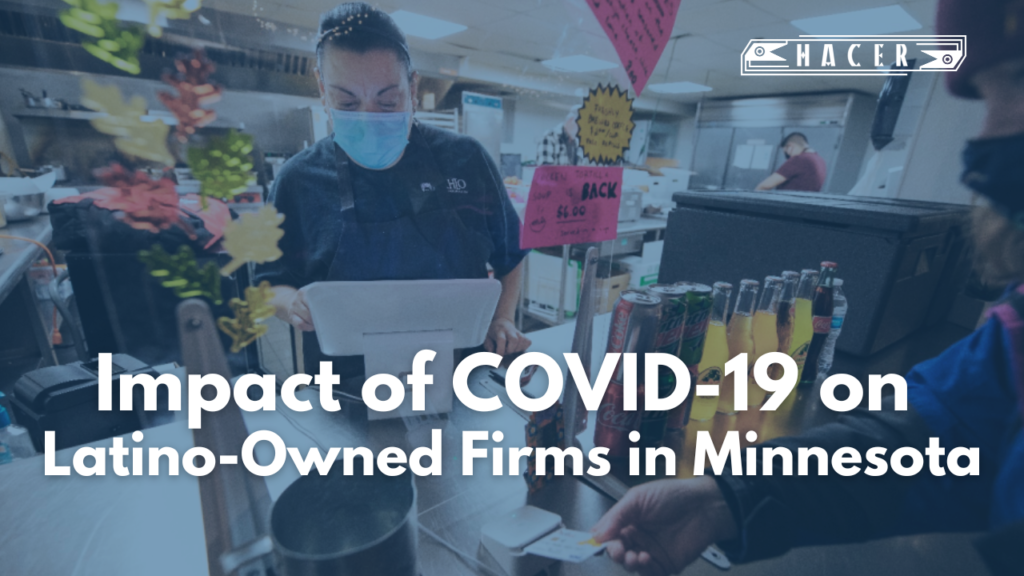
The COVID-19 pandemic has had sweeping economic repercussions. Evidence shows it has had disparate effects on both minority populations and people of color. To measure the economic impact of the pandemic on Latino-owned businesses in Minnesota, Hispanic Advocacy and Community Empowerment through Research (HACER) and the University of Minnesota’s Extension Center for Community Vitality conducted both a qualitative and quantitative survey to better understand how Latino-owned businesses have fared since the pandemic’s onset.
This research aims to provide insight into the current situation Minnesota’s Latino business owners are facing, their ability to weather the storm, and how the pandemic’s impacts on Latino businesses ripple throughout the economy. While the number of survey responses limits a generalization of findings, results do provide some indication of how firms are faring.
The U.S. Census Small Business Pulse Survey has been gathering data from firms across the nation since the start of the pandemic. This information augments the following research and provides a benchmark for comparing the data collected in this study.
Latino firms are slightly more likely to indicate a significant negative effect from COVID-19 than the broader business community. Pulse survey data reveals that, compared to the previous quarter, business applications in Minnesota decreased 2 percent during the first quarter of 2020 (-4 percent national average). During the second quarter, business applications decreased 2 percent (+5 percent national average), and during the third quarter, business applications in Minnesota increased 68 percent (+77 percent national average). While the uptick in new business applications is an encouraging indicator, small businesses have faced challenges due to the pandemic. According to the Census survey, 33 percent of responding firms across the nation in late September 2020 indicated the pandemic has had a significant negative effect on their business, while 44 percent mentioned a moderate negative effect. Data collected during this study showed that 43 percent of Latino business owners felt the pandemic is having a significant negative effect on their business revenue, while 35 percent reported a moderate negative effect. On the other hand, more Latino business owners (8 percent) reported feeling the pandemic has had a moderate positive effect on their business revenue compared to overall business owners in Minnesota (4 percent).
The pandemic created strains on the supply chain for many Minnesota firms. These challenges were mirrored at Latino firms. Statewide, 27 percent of businesses indicated supplier delays and 11 percent had difficulty locating alternate suppliers. Results from this survey showed 28 percent of Latino-owned businesses faced a reduction in the availability of main inputs from their suppliers.
There is evidence of disparities in access to COVID-19 relief programs. A higher percentage of Latino business owners have appealed to financial institutions for loans than other Minnesota businesses. Approximately 39 percent of Latino-owned businesses responding to the survey applied for new loans with financial institutions. Results from the U.S. Census survey revealed only 8 percent of all businesses in Minnesota did. However, Latino businesses have not accessed programs like the Paycheck Protection Plan (PPP) at the same rates as the broader business community. Results from the Census survey showed 73 percent of Minnesota businesses received the PPP. In comparison, 45 percent of Latino firms responding to this survey reported benefiting from the program. Moreover, only 10 percent of respondents felt it was easy to access information about the programs. Of the 90 percent indicating difficulty, the most common challenge was finding initial information about the program.
To quantify how COVID-19 impacts on Latino firms ripple throughout the economy, an economic impact analysis was conducted based on survey responses. Extension estimated the direct, indirect, and induced effects of the pandemic as related to Latino-owned businesses responding to the survey for this study. Pandemic-induced economic losses were estimated to be -$2,712,350. Beyond its immediate effect, the pandemic’s impact on businesses’ ability to invest in improvements and growth is also concerning. More than 50 percent of businesses reported COVID-19 had decreased their ability to make such investments.
